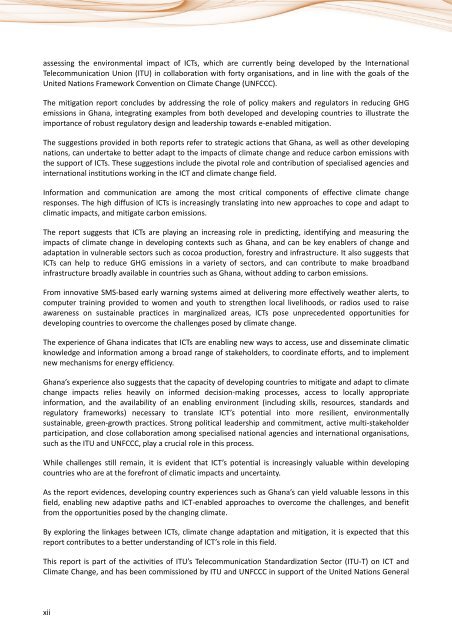Information and communication technologies (ICTs) and ... - ITU
Information and communication technologies (ICTs) and ... - ITU
Information and communication technologies (ICTs) and ... - ITU
You also want an ePaper? Increase the reach of your titles
YUMPU automatically turns print PDFs into web optimized ePapers that Google loves.
assessing the environmental impact of <strong>ICTs</strong>, which are currently being developed by the International<br />
Tele<strong>communication</strong> Union (<strong>ITU</strong>) in collaboration with forty organisations, <strong>and</strong> in line with the goals of the<br />
United Nations Framework Convention on Climate Change (UNFCCC).<br />
The mitigation report concludes by addressing the role of policy makers <strong>and</strong> regulators in reducing GHG<br />
emissions in Ghana, integrating examples from both developed <strong>and</strong> developing countries to illustrate the<br />
importance of robust regulatory design <strong>and</strong> leadership towards e-enabled mitigation.<br />
The suggestions provided in both reports refer to strategic actions that Ghana, as well as other developing<br />
nations, can undertake to better adapt to the impacts of climate change <strong>and</strong> reduce carbon emissions with<br />
the support of <strong>ICTs</strong>. These suggestions include the pivotal role <strong>and</strong> contribution of specialised agencies <strong>and</strong><br />
international institutions working in the ICT <strong>and</strong> climate change field.<br />
<strong>Information</strong> <strong>and</strong> <strong>communication</strong> are among the most critical components of effective climate change<br />
responses. The high diffusion of <strong>ICTs</strong> is increasingly translating into new approaches to cope <strong>and</strong> adapt to<br />
climatic impacts, <strong>and</strong> mitigate carbon emissions.<br />
The report suggests that <strong>ICTs</strong> are playing an increasing role in predicting, identifying <strong>and</strong> measuring the<br />
impacts of climate change in developing contexts such as Ghana, <strong>and</strong> can be key enablers of change <strong>and</strong><br />
adaptation in vulnerable sectors such as cocoa production, forestry <strong>and</strong> infrastructure. It also suggests that<br />
<strong>ICTs</strong> can help to reduce GHG emissions in a variety of sectors, <strong>and</strong> can contribute to make broadb<strong>and</strong><br />
infrastructure broadly available in countries such as Ghana, without adding to carbon emissions.<br />
From innovative SMS-based early warning systems aimed at delivering more effectively weather alerts, to<br />
computer training provided to women <strong>and</strong> youth to strengthen local livelihoods, or radios used to raise<br />
awareness on sustainable practices in marginalized areas, <strong>ICTs</strong> pose unprecedented opportunities for<br />
developing countries to overcome the challenges posed by climate change.<br />
The experience of Ghana indicates that <strong>ICTs</strong> are enabling new ways to access, use <strong>and</strong> disseminate climatic<br />
knowledge <strong>and</strong> information among a broad range of stakeholders, to coordinate efforts, <strong>and</strong> to implement<br />
new mechanisms for energy efficiency.<br />
Ghana’s experience also suggests that the capacity of developing countries to mitigate <strong>and</strong> adapt to climate<br />
change impacts relies heavily on informed decision-making processes, access to locally appropriate<br />
information, <strong>and</strong> the availability of an enabling environment (including skills, resources, st<strong>and</strong>ards <strong>and</strong><br />
regulatory frameworks) necessary to translate ICT’s potential into more resilient, environmentally<br />
sustainable, green-growth practices. Strong political leadership <strong>and</strong> commitment, active multi-stakeholder<br />
participation, <strong>and</strong> close collaboration among specialised national agencies <strong>and</strong> international organisations,<br />
such as the <strong>ITU</strong> <strong>and</strong> UNFCCC, play a crucial role in this process.<br />
While challenges still remain, it is evident that ICT’s potential is increasingly valuable within developing<br />
countries who are at the forefront of climatic impacts <strong>and</strong> uncertainty.<br />
As the report evidences, developing country experiences such as Ghana’s can yield valuable lessons in this<br />
field, enabling new adaptive paths <strong>and</strong> ICT-enabled approaches to overcome the challenges, <strong>and</strong> benefit<br />
from the opportunities posed by the changing climate.<br />
By exploring the linkages between <strong>ICTs</strong>, climate change adaptation <strong>and</strong> mitigation, it is expected that this<br />
report contributes to a better underst<strong>and</strong>ing of ICT’s role in this field.<br />
This report is part of the activities of <strong>ITU</strong>’s Tele<strong>communication</strong> St<strong>and</strong>ardization Sector (<strong>ITU</strong>-T) on ICT <strong>and</strong><br />
Climate Change, <strong>and</strong> has been commissioned by <strong>ITU</strong> <strong>and</strong> UNFCCC in support of the United Nations General<br />
xii

















